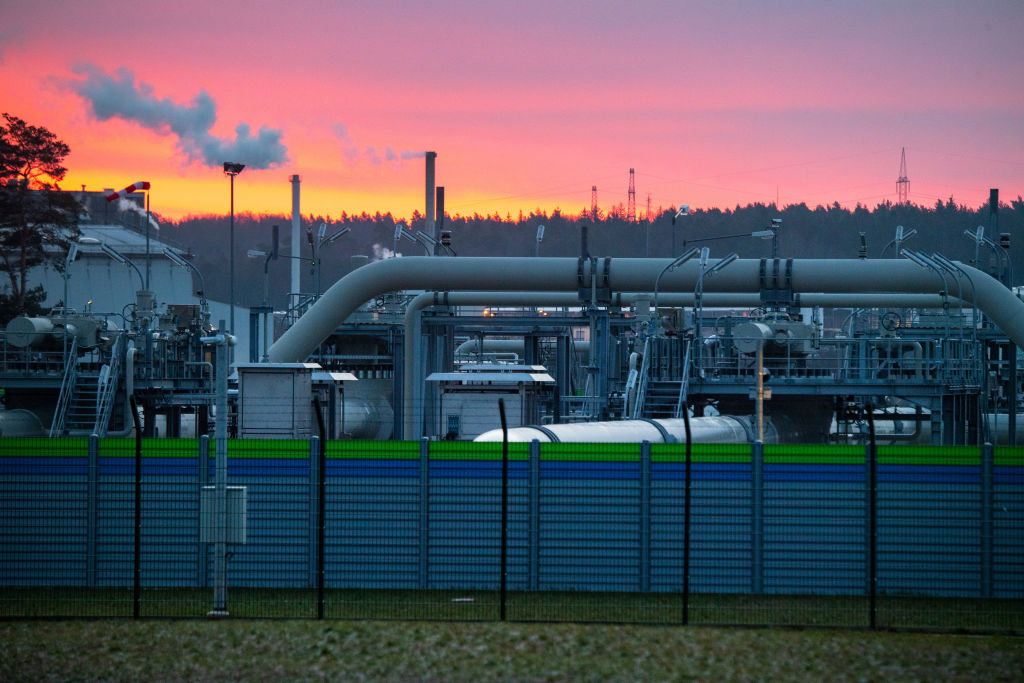
Escalating tensions with Russia are forcing a confrontation with an uncomfortable reality for European leaders: Vladimir Putin holds the cards when it comes to Europe’s energy needs.
The E.U. imports 35% of its natural gas from Russia. As countries like the Netherlands and Germany have wound down domestic fossil fuel production in recent decades—whether because of depleted reserves or environmental policies—Europe has increasingly turned towards cheap and plentiful imports of Russian natural gas, critical for electricity and heating.
The risks of that dependence—long a source of concern for Russia hawks in the U.S. and Europe—have been crystallizing for months. Natural gas prices nearly tripled last year after demand spiked following the end of pandemic lockdowns, plunging Europe into its most severe energy crisis since the 1970’s. The International Energy Agency says Russia has already worsened the situation by deliberately squeezing gas exports. A military conflict over Ukraine may choke supply even further, spelling some painful months, or even years, for Europe.
But some environmentalists see a silver lining here: this moment could, they argue, act as a wake-up call for Europe on the risks of a fossil-fueled world. “If Europe doesn’t want to be exposed to geopolitical risks like this, it needs to reduce its dependence on natural gas as quickly as possible,” says Euan Graham, a gas transition researcher at climate think tank E3G. “It should act as a real springboard to kind of rethink Europe’s relationship with gas.”
Germany, the E.U.’s center of gravity and one of the countries most dependent on Russian natural gas, has long tried to frame its foreign policy and its energy needs as separate issues. But its new government has signaled it might now shelve authorization of Nord Stream-2, a pipeline that would have boosted gas imports from Russia.
A version of this story first appeared in the Climate is Everything newsletter. To sign up, click here.
If Russia invades Ukraine and enters a military conflict with NATO powers, natural gas prices could well double from their already high levels, says Massimo Di Odoardo, vice president of global gas research at energy consultancy Wood Mackenzie. “There’s no telling how high [prices] will go and there’s very little Europe could do to prevent the increases.”
The E.U.’s big fear is that U.S. sanctions, which may limit Russia‘s ability to use dollars or international payment systems, would make it difficult for customers to pay for natural gas orders and cause hold-ups. In a worst case but less likely scenario, Russia could retaliate to sanctions by deliberately slashing gas flows to Europe. “In the Armageddon event that Russia kind of halves exports,” said Di Odoardo, “Europe could only last around six weeks [in cold weather] with the level of storage that they have,” before power outages and rationing would begin in some countries.
Then there’s the potential for physical damage to gas infrastructure and operations in Ukraine itself, through which roughly a third of Russian exports to Europe flow, which would cause market jitters, likely leading to price increases.
In the short term, Europe has few options to shift its energy mix away from Russian natural gas. Between low reserves, long timelines for new projects, and the E.U.’s green energy ambitions, it would be all but impossible for Europe to significantly step up its own natural gas production. The bloc could partially re-activate recently decommissioned coal plants—undermining its emissions goals with the dirtier fossil fuel—and nuclear plants. But according to Wood Mackenzie doing so would provide at best about 10% of the electricity currently generated by natural gas. And, when it comes to heating, millions of homes across Europe have no alternative but to use natural gas because of the way they are set up.
Europe’s only choice to weather the immediate impact of diminished gas supply would be to seek imports of liquified natural gas (LNG)—a form of the fuel that can be transported from far away by ships—from major producers like the U.S. and Qatar, and the Biden administration is holding crisis talks to help Europe do that. But those countries’ output can only be marginally increased, analysts say, so Europe would be competing with Asian countries for supply. That could spark global price increases.
In the long term, climate advocates say cutting Europe’s dependence on natural gas means scaling up renewable energy as fast as possible for electricity production, as well as overhauling buildings to use clean heating technologies like heat pumps and increasing energy efficiency through insulation retrofits. The latter has the added benefit of allowing governments to prioritize social housing where residents would feel the pain of gas price increases most, according to Graham.
Clean energy and efficiency projects will not solve Europe’s energy crisis within the next few months. But for the region’s leaders, the lessons of this moment will likely shape decisions for years to come. “If we really want to stop long-term making Putin very rich, we have to invest in renewables and we need to do it quickly,” the E.U.’s climate chief Frans Timmermans said Friday. “If you really want to make sure that you can provide stable, affordable energy to your citizens, renewables is the answer.”
More Must-Reads from TIME
- Inside Elon Musk’s War on Washington
- Meet the 2025 Women of the Year
- The Harsh Truth About Disability Inclusion
- Why Do More Young Adults Have Cancer?
- Colman Domingo Leads With Radical Love
- How to Get Better at Doing Things Alone
- Cecily Strong on Goober the Clown
- Column: The Rise of America’s Broligarchy
Write to Ciara Nugent at ciara.nugent@time.com